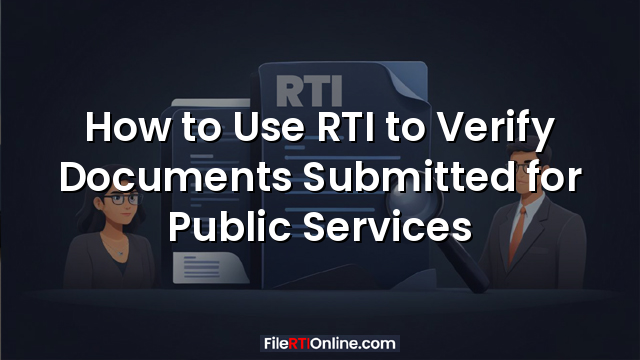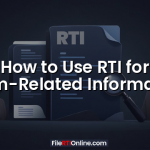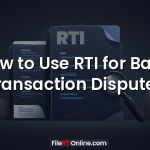Verification of identity and address documents is a critical requirement for obtaining public services such as telephone connections, electricity connections, water supply, LPG connections, and government benefits. However, fraudulent or forged documents are often used to secure such services, causing significant challenges for law-enforcement agencies, service providers, and affected individuals.
The Right to Information (RTI) Act, 2005 plays an important role in helping citizens uncover irregularities, expose fraud, and ensure transparency in the documentation process. A key case involving Bharat Sanchar Nigam Limited (BSNL) before the Central Information Commission (CIC) provides clear guidance on when personal documents of a third party may be disclosed and under what conditions larger public interest overrides privacy exemptions.
This article provides a complete guide on using RTI for verifying documents submitted or service users, with the BSNL case as a detailed example.
Can RTI Be Used to Check Documents Submitted for Public Services?
Yes. Under certain circumstances, RTI can be used to access the documents submitted for obtaining public services such as telephone connections. However, such information generally falls under exempt categories such as:
- Section 8(1)(d) – commercial confidence
- Section 8(1)(e) – fiduciary relationship
- Section 8(1)(j) – personal information
These exemptions apply unless the appellant can demonstrate larger public interest, which allows disclosure even of otherwise exempt personal information.
The BSNL case illustrates this principle clearly.
Case Example: RTI Request to BSNL for Subscriber’s Documents
Background
An appellant sought copies of documents submitted BSNL subscriber (Mr. Bhanwarlal Choudhary) while applying for a telephone connection. These typically include:
- Proof of identity
- Proof of address
- Ration card or similar documents
The BSNL Public Information Officer (PIO) initially denied the request, invoking multiple exemptions under the RTI Act:
- Section 8(1)(d) – commercial confidence
- Section 8(1)(e) – fiduciary relationship
- Section 8(1)(j) – personal information
The PIO argued that documents submitted customer are private and cannot be shared without demonstrating larger public interest.
Proceedings Before CIC: How Larger Public Interest Was Established
During the hearing, the appellant submitted evidence showing:
- The ration card provided subscriber was bogus.
- The rationing officer confirmed forgery and had filed an FIR.
- The subscriber was involved in large-scale fraud in Surat.
- The Superintendent of Police confirmed multiple FIRs against him.
These facts showed that the information sought was not to invade privacy but to expose fraud involving forged documents.
The PIO accepted that larger public interest was clearly established.
CIC’s Decision: Disclosure Ordered
The Central Information Commission directed BSNL to:
- Furnish copies of the documents submitted subscriber
- Comply fully with the RTI request
The CIC held that when prima facie evidence of fraud is presented, and the documents are relevant for accountability, transparency, and investigation, public interest outweighs privacy claims.
Key Takeaways for Using RTI to Verify Documents
1. Third-party documents are usually protected
In normal circumstances, personal documents submitted cannot be disclosed without the third party’s consent.
2. Disclosure becomes permissible when fraud, forgery, or public harm is involved
If you can demonstrate:
- Use of fake documents
- Ongoing criminal investigation
- Public safety concerns
- Misuse of public resources
then larger public interest overrides privacy.
3. Provide supporting evidence
If alleging fraud, attach:
- FIR copies
- Written confirmations from authorities
- Any official correspondence
- Proof of harm or potential misuse
This significantly strengthens your RTI claim.
4. CIC prioritises public accountability
When the use of forged documents affects public agencies, CIC generally favours transparency.
When Should You File an RTI to Verify Documents?
You may use RTI in situations such as:
- A neighbour using forged documents to obtain a utility connection
- A trust or society using fabricated papers
- Fraudulent identity proofs submitted for government benefits
- Illegal telecom or broadband connections operated under false identity
- Misuse of public facilities through impersonation
RTI becomes an effective tool when public authorities do not respond or when you need verified documents for initiating a legal or police complaint.
Sample RTI Request to Verify Documents Submitted for a Public Service
Subject: Request for Information Under the RTI Act, 2005
Information Requested:
- Copies of documents submitted [Name] for obtaining a telephone/utility/service connection.
- Certified details of identity and address proofs submitted.
- Whether any verification was conducted department before issuing the service.
Ground of Larger Public Interest:
Provide a brief note stating:
- The documents appear forged
- FIRs or complaints filed
- Public resources have been misused
Conclusion
The BSNL case demonstrates that RTI is a powerful tool to expose fraud, especially when forged documents are used to obtain public services. Though personal documents are normally exempt from disclosure, the presence of criminal activity, falsification, or misuse of public services creates a strong justification for disclosure in the public interest.


